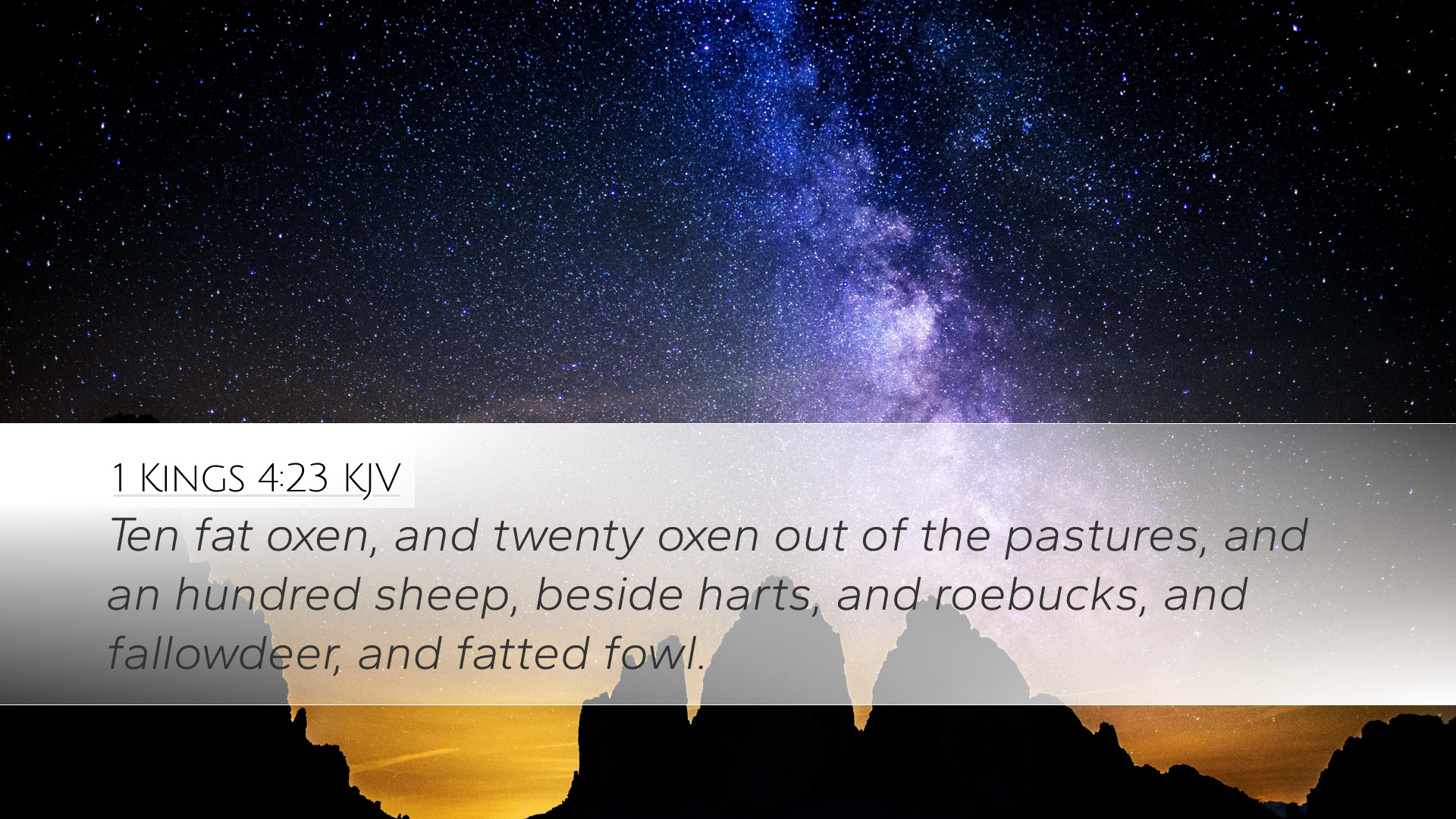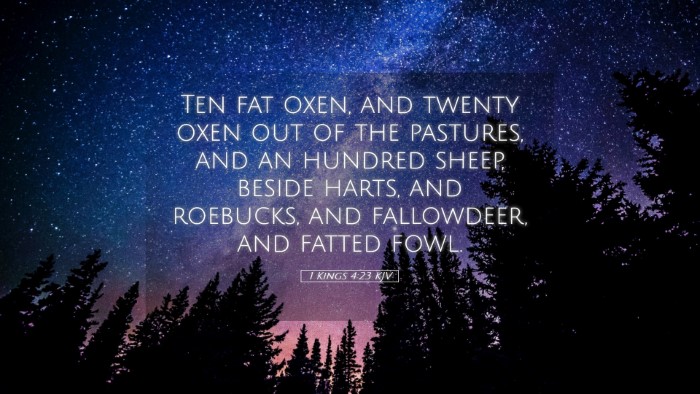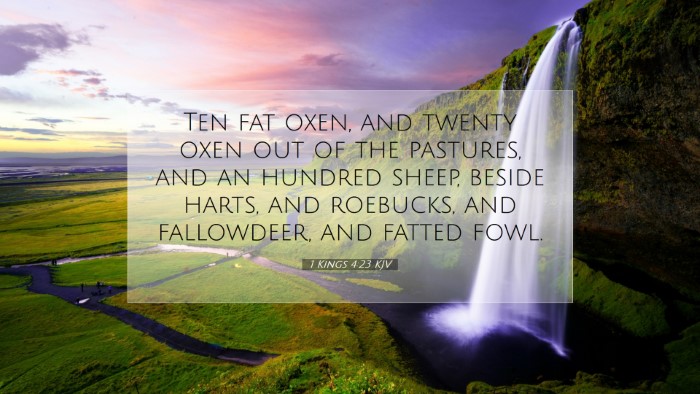Commentary on 1 Kings 4:23
Verse Analysis: The verse reads: "Ten fat oxen, and twenty oxen out of the pastures, and an hundred sheep, beside harts, and roebucks, and fallow deer, and fattened fowl." This passage presents a glimpse into the royal court of Solomon, highlighting the abundance and the lavish nature of the king's provisions for his officials and guests.
General Overview
This verse occurs within a broader narrative that elaborates on Solomon’s reign, emphasizing his wisdom and the prosperity of Israel during his time. The abundance of sacrifices and provisions reflects not only the wealth of the nation but also the peace and stability that characterizes Solomon’s rule.
Commentary Insights
Matthew Henry's Commentary
Matthew Henry emphasizes the significance of the provisions that were made during King Solomon's reign. He notes that the lavish offerings indicated the great wealth and prosperity of Israel under Solomon’s leadership. Henry posits that this abundance was a sign of God's blessing on Solomon, who had asked for wisdom instead of riches (1 Kings 3:5-15).
Henry also reflects on the importance of hospitality in royal settings, suggesting that such ample provisions were necessary to honor visiting dignitaries and ensure the happiness of those within the king's court. Hospitality, in this context, is not only a cultural norm but also a spiritual expression of gratitude to God’s bounty.
Albert Barnes' Commentary
Albert Barnes provides further insights into the specific animals mentioned in the verse. He notes that the "ten fat oxen" and other livestock were selected for their quality, indicative of a meticulous standard that Solomon upheld in his preparations. Barnes elucidates that these figures represent a well-ordered and prosperous monarchy, compliant with God's intentions for Israel’s blessing through good governance.
Barnes also points out the variety of animals referenced: harts, roebucks, deer, and fattened fowl. This variety highlights the extensive resources available to Solomon, which served not just merely for sustenance but also for offerings and celebratory feasts that lay the groundwork for national unity and divine worship.
Adam Clarke's Commentary
Adam Clarke identifies the theological implications of the provisions listed in 1 Kings 4:23. He articulates that the multitude of animals signifies more than mere abundance; it also symbolizes the divine favor granted to Solomon. Clarke emphasizes that such wealth allowed for the proper worship and offerings to God, reinforcing a vital connection between the king’s provisions and the nation’s spiritual health.
Moreover, Clarke mentions that the precise numbers given in the account reflect a historic tradition of record-keeping within royal administrations. This suggests that these scriptures serve both a spiritual and a historical purpose, providing insight into the economic and cultural frameworks of ancient Israel.
Theological Implications
From a theological standpoint, 1 Kings 4:23 serves as a reminder of the relationship between faithfulness to God and the overflow of blessings. The prosperity of Solomon's reign epitomizes the idea that national wellness is closely tied to the worship and obedience to the covenant God established with Israel. The preparations highlighted here suggest that genuine worship involves offerings that honor God, indicating a reciprocal relationship between divine providence and human gratitude.
Practical Applications
For pastors, students, theologians, and Bible scholars seeking to glean practical insights from this verse, several applications can be drawn:
- Importance of Generosity: The extent of Solomon’s provisions can teach modern believers about the significance of generosity in the community and the importance of sharing resources for the greater good.
- Celebration and Worship: This passage encourages congregations to create vibrant expressions of worship that reflect the goodness of God, using their resources to celebrate His blessings.
- Leadership and Stewardship: For those in leadership positions, it serves as a reminder of the responsibility that comes with power and resources. Stewardship involves managing God’s gifts wisely and for the benefit of others.
- Prayer and Pursuit of Wisdom: Just as Solomon prioritized wisdom, leaders today are challenged to seek God’s guidance in decision-making processes, ensuring that their leadership is rooted in divine insight rather than worldly gain.
Conclusion
1 Kings 4:23, while it may seem like a simple account of royal provisions, holds profound meanings that speak to the heart of worship, leadership, and the blessings of God. By merging insights from commentaries by noted scholars such as Matthew Henry, Albert Barnes, and Adam Clarke, we can appreciate the richness of Scripture and draw lessons applicable in contemporary contexts. The opulence described reveals God's generous hand, inviting all believers to respond with gratitude, generosity, and reverence in their daily lives.


